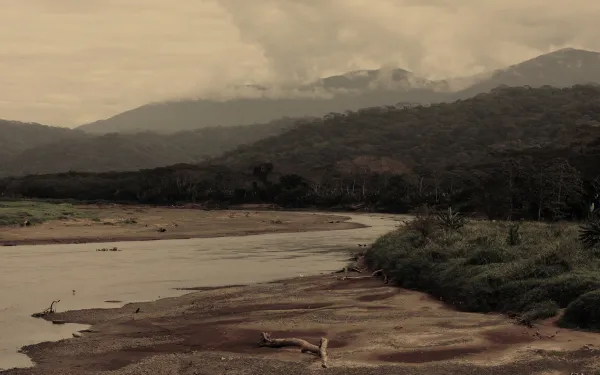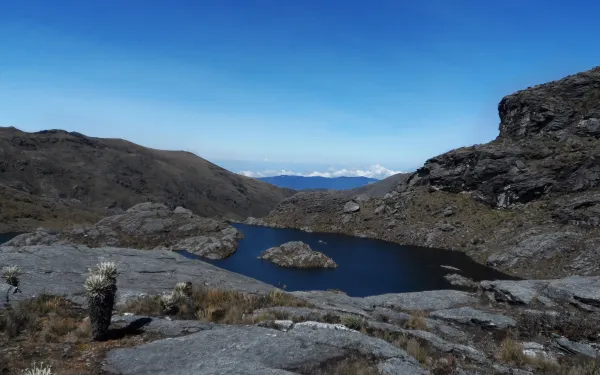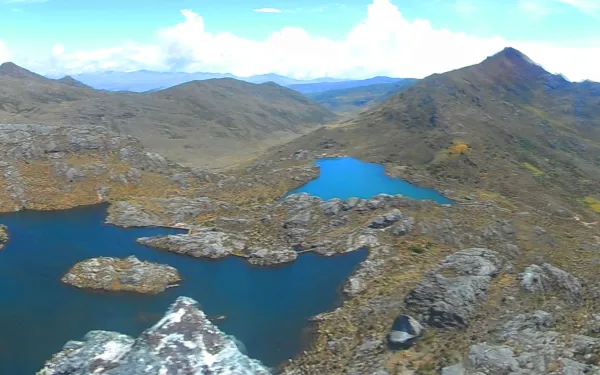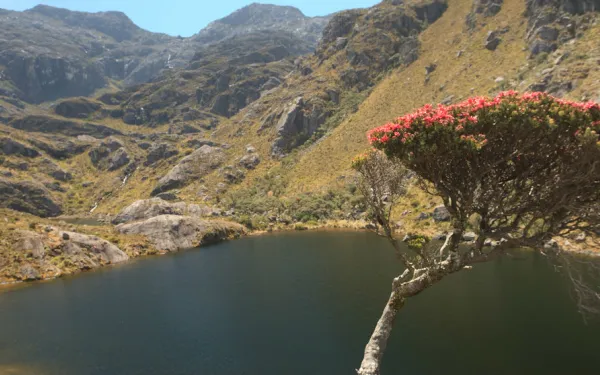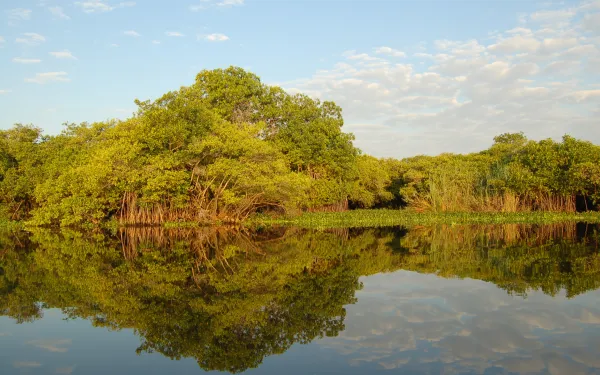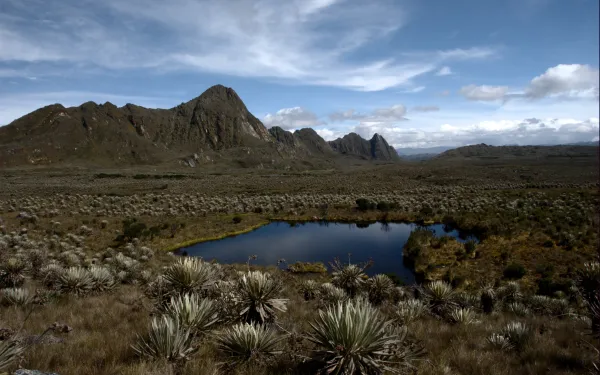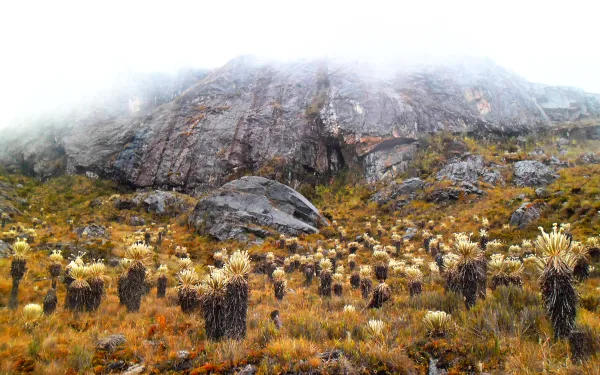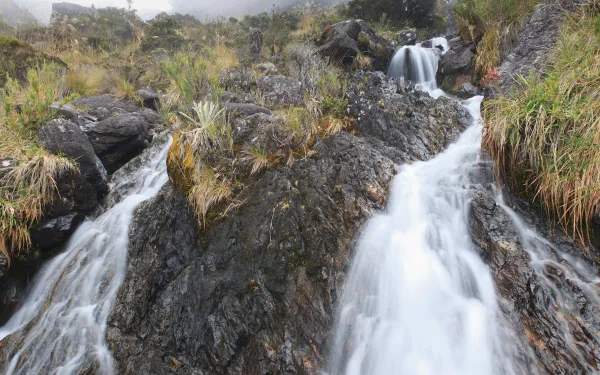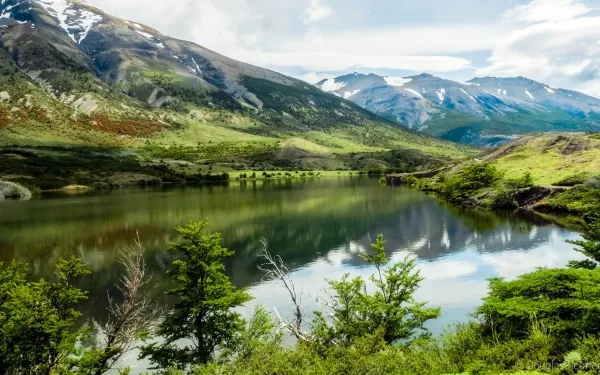Colombia’s Constitutional Court has ruled against a controversial legal loophole permitting oil, gas and mining operations in the country’s paramos - high altitude eco-systems. Colombia’s paramos are the most extensive on earth and supply more than 70% of the country’s population with water, according to the Bogota-based Alexander von Humboldt Institute.
The loophole is in a June 2015 law implementing Colombia’s “National Development Plan 2014-2018.” The law prohibits “agricultural activities” and the “exploration for or exploitation of non-renewable natural resources”, as well as the “construction of oil and gas refineries”, in paramos, but then states that mining operations which have contracts and environmental licenses dating to before 9 February 2010, or oil and gas operations with contracts and licenses dating to before 16 June 2011, are exempted.
This was challenged by four congressmen, three lawyers and 12 representatives from a coalition called the Cumbre Agraria, Campesina, Étnica y Popular, who argued that the loophole violates rights to the environment, water and Colombia’s patrimony because of the impacts oil, gas and mining operations would have on the paramos’ vegetation, soil, sub-soil and water. On 8 February the court’s ruling, which was made public on Thursday, deemed three paragraphs relating to the loophole in the June 2015 law “unconstitutional” - or “inexequible” in Colombian Spanish.
“Paramo eco-systems exist in very few places in the world and Colombia is privileged to be the country that has the highest number of paramos globally,” senator Alberto Castillo, one of the plaintiffs, told the Guardian.“Because of this, we believe that the absolute ban on natural resource extraction that we now have in Colombia is of great magnitude and should delight the world.”
“It’s a ruling that will make history,” says senator Iván Cepeda, another plaintiff. “The court went further than we hoped, without a doubt. [Mining and oil and gas operations in the paramos] is a serious abuse against natural resources, especially the fundamental right to water.”
“The court’s ruling is a major advance in environmental matters,” Viviana Tacha, another plaintiff and an adviser to senator Castillo, told the Guardian. “No doubt about it, it’s a victory for the entire country and for the communities resisting the imposition of a development model based on natural resource extraction which fails to take into account the environment and local people. Given global concern about climate change, the protection of the paramos by the court is one of the most important recent decisions on environmental matters.”
According to a communiqué by the court issued on 8 February, the offending three paragraphs “ignore the constitutional duty to protect areas of special ecological importance [and] put at risk the fundamental rights of the entire population to access good quality water.”
The communiqué says the court arrived at its decision after “analyzing the state’s power to intervene in the economy and its duty to protect areas of special ecological importance, weighing them up against economic freedom and the rights of individuals to exploit the state’s resources.” It concluded that, in this case, the former overrides the latter for three reasons: 1) the current lack of protection of paramos; 2) the “fundamental role” played by paramos in regulating the country’s drinking water cycle and providing cheap, high-quality water to 70% of the population; and 3) the particular vulnerability of paramos due to their “relative isolation”, low temperatures and low oxygen levels.
Carlos Lozano-Acosta, from the Interamerican Association for Environmental Defense (AIDA), told the Guardian the court’s decision is “historic” and sets an example to other countries in the Andean region where there are paramos. “The paramos [in Colombia] are vital because they’re a source of drinking water for 70% of Colombians, strategic reserves of biodiversity, and carbon sequesters,” he says. “The court acknowledged all that in the sentence.”
An ‘amicus brief’ sent to the court and written by Lozano-Acosta together with the Bogota-based NGO Asociación Ambiente y Sociedad (AAS) argued that the loophole contradicts Colombia’s constitution, international environmental law, and international treaties signed by Colombia, such as the United Nations Framework Convention on Climate Change, the Convention on Biological Diversity and the Ramsar Convention.
NGO Dejusticia, also based in Bogota, is another civil society organisation which sent an ‘amicus brief’ to the court, calling the crucial three paragraphs an “unjustified regression” because mining, oil and gas operations in paramos had already been banned back in 2010 and 2011. “Before [the June 2015] law, such activities were prohibited,” the NGO stated in an interview in Colombian newspaper El Espectador. “This means that the current National Development Plan is a step backwards in protecting the paramos.”
That “regression” was acknowledged by the court in its ruling, which described the offending paragraphs as “reestablishing the possibility” of oil, gas and mining operations in paramos despite them being “prohibited by Laws 1382 in 2010 and 1450 in 2011.”
“The paramos are key ecosystems and water sources which are insufficiently protected,” Dejusticia’s Diana Rodriguez told the Guardian. “We’re thrilled the court has taken a stand for their immediate protection and sent a message that economic development cannot sacrifice respect for the environment.”
Just how big an impact the court’s ruling could or will have isn’t immediately clear. How many oil, gas or mining operations stand to be affected? In its interview with El Espectador, Dejusticia stated that the National Mining Agency (NMA) believes approximately 500 mining titles covering over 140,000 hectares of the paramos have been issued, while senator Castillo told the Guardian the NMA states there are currently 448 mining titles in paramos - 347 of which have environmental licences.
“Taking into account that this is official information, which the court itself recognized, other sources have no basis in speaking of lower numbers,” Castillo says. “The three companies who have most mining titles in the paramos are AngloGold Ashanti Colombia S.A., Eco Oro Minerales Corp and Leytah Colombia.”
Senator Cepeda told the Guardian the 448 mining titles include 26 of Colombia’s 32 paramos and extend for more than 118,000 hectares, “more than 11,000 of which are [also] affected by four oil and gas projects.”
According to one media report, Environment Minister Gabriel Vallejo has said he will request a clarification from the court and believes that “other sources” say up to 522 titles could be affected. “There are very different estimates about the number of titles and even more confusion related to how many have environmental licenses,” says Dejusticia’s Rodriguez. “Indeed, some mining companies didn’t wait for the [court’s] full ruling [and] already announced that they will forego their mining concessions in the paramos.”
Another question is how far Colombia’s paramos extend. Although the court’s ruling cites a 2011 Humboldt Institute publication stating there are 1.9 million hectares in Colombia, Humboldt’s Carlos Sarmiento told the Guardian their current estimate is 2.9 million hectares - 2.5% of national territory. That 2.9 million figure is also used by the Ministry of Environment and Sustainable Development. But what if the government disagrees that certain areas really are paramos, and permits oil, gas or mining operations to take place there anyway?
As the court’s ruling acknowledges, the paragraph immediately preceding the three offending paragraphs in the June 2015 law states that ultimately it is the Environment Ministry which, according to its own “technical, environmental, social and economic criteria”, is responsible for “delimiting” paramos. And that paragraph wasn’t challenged by the plaintiffs.
“The court’s decision could result ineffective given that that part of Article 174 wasn’t part of the lawsuit and Congress has given the Environment Ministry the function of delimiting paramos, and in doing that the Ministry isn’t subject to the scientific criteria established by the Alexander von Humboldt Institute,” the court ruled. “It would be possible for the Ministry to not delimit paramos, or exclude from delimitation, certain areas where mining or hydrocarbon operations are happening or are going to happen. That would nullify [our] decision because such operations could take place in areas that have been scientifically classified as paramos, but the Ministry has excluded.”
AIDA’s Lozano-Acosta says that risk exists “without a doubt.”
“But the court also said that the government mustn’t ignore the Humboldt Institute’s technical recommendations,” he told the Guardian.
For senator Castillo, that risk only exists “if the Ministry doesn’t closely read the court’s sentence or doesn’t want to comply with it.”
“In the court’s words, delimitation must ensure the maximum degree of protection,” Castillo says. “This is absolutely crucial given that what the government wants to do is reduce to the utmost the extent of the paramos via a very restricted delimitation process and thereby pave the way for exploitation. Dispute will continue in the delimitation of each paramo, but we will continue in their defence and the court’s sentence gives us many tools to do so.”
According to senator Cepeda, the court’s ruling will lead to a “profound discussion about how paramos are delimited.” He told the Guardian that the plaintiffs, together with environmental organisations and others, intend to ensure the government abides by the court’s ruling and “will seek the suspension of more than 400 mining titles.”
AAS’s Margarita Florez says the court’s ruling cannot be appealed. “The decision is a constitutional sentence and therefore it is binding on the government and must be complied with,” she told the Guardian. “There is no way to appeal it.”
The court’s ruling cites various definitions of paramos, including “the highest and most exposed regions of tropical Andean mountain ranges” and “neotropical mountains between the upper limit of forest vegetation (3,200-3,800 ms above sea level) and the lower limit of perpetual snows (4,400-4,700 ms) in Andean systems.” It quotes the Humboldt Institute describing them as “key sites that “harvest” rainfall and snow water stored in glacial lakes, bogs, marshes and peat soils” that are “held for a relatively long period of time and released constantly and slowly.”
Read more 